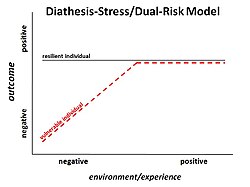Diathesis–stress model

The diathesis–stress model is a way of thinking about mental health that explains why some people develop mental health issues and others don't. It says that everyone has something called a 'diathesis', which is like a biological or psychological vulnerability to mental health problems. For example, if someone has a family history of depression, they may have a diathesis for depression.
People with a diathesis are more likely to develop mental health issues if they experience a lot of stress. So if someone has a diathesis for depression and they experience a lot of stress, like from a traumatic life event, they are more likely to develop depression.
In other words, the diathesis–stress model suggests that some people are more likely to develop mental health issues if they experience a lot of stress, but not everyone who experiences a lot of stress will develop one.
People with a diathesis are more likely to develop mental health issues if they experience a lot of stress. So if someone has a diathesis for depression and they experience a lot of stress, like from a traumatic life event, they are more likely to develop depression.
In other words, the diathesis–stress model suggests that some people are more likely to develop mental health issues if they experience a lot of stress, but not everyone who experiences a lot of stress will develop one.
Related topics others have asked about:
